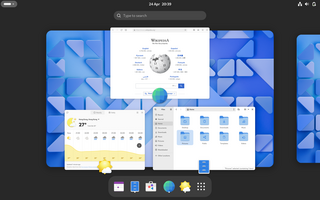
The Common Desktop Environment (CDE) is a desktop environment for Unix and OpenVMS, based on the Motif widget toolkit. It was part of the UNIX 98 Workstation Product Standard, and was for a long time the Unix desktop associated with commercial Unix workstations. It helped to influence early implementations of successor projects such as KDE and GNOME desktop environment, which largely replaced CDE following the turn of the century.

Sun Microsystems, Inc., was an American technology company that sold computers, computer components, software, and information technology services and created the Java programming language, the Solaris operating system, ZFS, the Network File System (NFS), and SPARC microprocessors. Sun contributed significantly to the evolution of several key computing technologies, among them Unix, RISC processors, thin client computing, and virtualized computing. Notable Sun acquisitions include Cray Business Systems Division, Storagetek, and Innotek GmbH, creators of VirtualBox. Sun was founded on February 24, 1982. At its height, the Sun headquarters were in Santa Clara, California, on the former west campus of the Agnews Developmental Center.

Solaris is a proprietary Unix operating system originally developed by Sun Microsystems. After the Sun acquisition by Oracle in 2010, it was renamed Oracle Solaris.

OpenOffice.org (OOo), commonly known as OpenOffice, is a discontinued open-source office suite. Active successor projects include LibreOffice, Apache OpenOffice, Collabora Online and NeoOffice.

StarOffice is a discontinued proprietary office suite. Its source code continues today in derived open-source office suites Collabora Online and LibreOffice. StarOffice supported the OpenOffice.org XML file format, as well as the OpenDocument standard, and could generate PDF and Flash formats. It included templates, a macro recorder, and a software development kit (SDK).

OpenSolaris is a discontinued open-source computer operating system based on Solaris and created by Sun Microsystems. It was also, perhaps confusingly, the name of a project initiated by Sun to build a developer and user community around the eponymous operating system software.

SUSE Linux Enterprise is a Linux-based operating system developed by SUSE. It is available in two editions, suffixed with Server (SLES) for servers and mainframes, and Desktop (SLED) for workstations and desktop computers. Its major versions are released at an interval of 3–4 years, while minor versions are released about every 12 months. SUSE Linux Enterprise products receive more intense testing than the upstream openSUSE community product, with the intention that only mature, stable versions of the included components will make it through to the released enterprise product.
Oracle Communications Messaging Server is Oracle's messaging (email) server software. The software was obtained by Oracle as part of the company's acquisition of Sun in 2010.
The Sun Java System Directory Server is a discontinued LDAP directory server and DSML server written in C and originally developed by Sun Microsystems. The Java System Directory Server is a component of the Java Enterprise System. Earlier iterations of Sun Java System Directory Server were known as Sun ONE Directory Server, iPlanet Directory Server, and, before that, Netscape Directory Server.
A desktop environment is a collection of software designed to give functionality and a certain look and feel to an operating system.

In the 1950s and 1960s, computer operating software and compilers were delivered as a part of hardware purchases without separate fees. At the time, source code, the human-readable form of software, was generally distributed with the software providing the ability to fix bugs or add new functions. Universities were early adopters of computing technology. Many of the modifications developed by universities were openly shared, in keeping with the academic principles of sharing knowledge, and organizations sprung up to facilitate sharing. As large-scale operating systems matured, fewer organizations allowed modifications to the operating software, and eventually such operating systems were closed to modification. However, utilities and other added-function applications are still shared and new organizations have been formed to promote the sharing of software.
Oracle Secure Global Desktop (SGD) software provides secure access to both published applications and published desktops running on Microsoft Windows, Unix, mainframe and IBM i systems via a variety of clients ranging from fat PCs to thin clients such as Sun Rays.

JavaFX is a software platform for creating and delivering desktop applications, as well as rich web applications that can run across a wide variety of devices. JavaFX has support for desktop computers and web browsers on Microsoft Windows, Linux, and macOS, as well as mobile devices running iOS and Android, through Gluon Mobile.

Orca is a free and open-source, flexible, extensible screen reader from the GNOME project for individuals who are blind or visually impaired. Using various combinations of speech synthesis and braille, Orca helps provide access to applications and toolkits that support AT-SPI.
java-gnome is a set of language bindings for the Java programming language for use in the GNOME desktop environment. It is part of the official GNOME language bindings suite and provides a set of libraries allowing developers to write computer programs for GNOME using the Java programming language and the GTK cross-platform widget toolkit.

GNOME, originally an acronym for GNU Network Object Model Environment, is a free and open-source desktop environment for Linux and other Unix-like operating systems.

GNOME Shell is the graphical shell of the GNOME desktop environment starting with version 3, which was released on April 6, 2011. It provides basic functions like launching applications, switching between windows and is also a widget engine. GNOME Shell replaced GNOME Panel and some ancillary components of GNOME 2.
The Java Development Kit (JDK) is a distribution of Java Technology by Oracle Corporation. It implements the Java Language Specification (JLS) and the Java Virtual Machine Specification (JVMS) and provides the Standard Edition (SE) of the Java Application Programming Interface (API). It is derivative of the community driven OpenJDK which Oracle stewards. It provides software for working with Java applications. Examples of included software are the virtual machine, a compiler, performance monitoring tools, a debugger, and other utilities that Oracle considers useful for a Java programmer.













